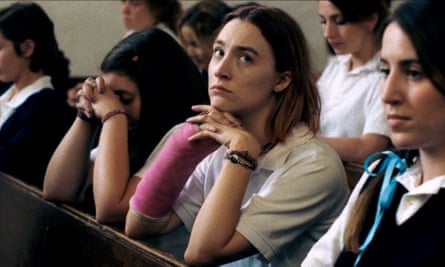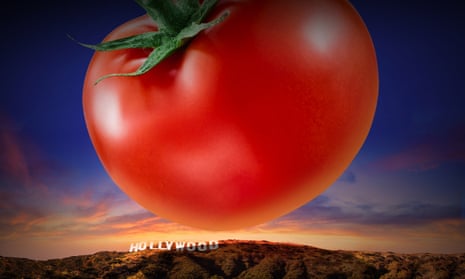Twenty years ago, the internet was a very different place. Google was a fresh rival to Alta Vista and Lycos. Apple computers looked like boiled sweets, and we dialled up to “surf the net”, having installed the software via CD-Rom. The movie world of 1998 was also somewhat different: the box office was ruled by meteorite movies and Adam Sandler; Harvey Weinstein was an Oscar winner; and The Avengers was a lame, retro spy comedy with Ralph Fiennes and Uma Thurman. It was into this climate that Senh Duong launched Rotten Tomatoes – known in the business as RT – a site that has transformed both worlds, although nobody seems quite sure if it has done so for better or worse.
The Guardian’s product and service reviews are independent and are in no way influenced by any advertiser or commercial initiative. We will earn a commission from the retailer if you buy something through an affiliate link. Learn more.
Duong’s idea was simple – to compile movie reviews – and it still drives Rotten Tomatoes. He was inspired by his love of Jackie Chan and Jet Li movies and would scour the internet looking for reviews of them. So why not put them in one place? Duong already had a full-time job, he says. “Rotten Tomatoes was a side project I worked on in the evenings.” He single-handedly designed and coded the site in just two weeks. “It was very laborious. Every page was manually assembled using HTML. Every review was manually searched for, read and quoted.”
In the same way that, say, lastminute.com and Expedia compare plane ticket prices, Rotten Tomatoes’ review aggregation has turned out to be super-useful, particularly as it boils all those reviews down to a single, convenient percentage score. It then boils down that score even further, to a simple graphic of a tomato. In the same way that Siskel and Ebert gave a “thumbs up” or a “thumbs down”, or the man from Del Monte tasted a pineapple and said “yes” or “no”, so Rotten Tomatoes’ “Tomatometer” separates movies into “fresh” or “rotten”. If at least 60% of a movie’s reviews are positive, it is graded “fresh”, signified by a ripe, red tomato. Less than 60% and it is “rotten”, signified by a green splat. Over 75% gets you a “certified fresh” logo, like a sticker on a quality piece of fruit. (The 1998 Avengers movie, if you were wondering, scored a supremely rotten 5%.)

Today, movies supposedly live or die by the ripeness of that virtual fruit. Rotten Tomatoes has become the one movie site to aggregate them all. The Tomatometer appears not only on Rotten Tomatoes’ site but also on ticketing sites such as AMC cinemas and Fandango (which has owned Rotten Tomatoes since 2016). It comes up on Google searches, iTunes, SoundCloud, in Twitter and chatroom discussions and (as long as the rating is “fresh”) in movie studios’ marketing campaigns. It is a news item when a movie achieves a “100% fresh” rating, as recently happened with Paddington 2 and, before that, Greta Gerwig’s Lady Bird.
With its dominance and prominence, Rotten Tomatoes is becoming the story – and not always in a good way. After Lady Bird got its 100% score, for example, one critic opted to lob a green splat into the mix, not because he hated the movie, but because everyone else liked it so much. “I had to consider whether to cast Lady Bird as fresh or rotten in the context of a perfect score that people were using to trumpet Lady Bird as the all-time best-reviewed movie on RT,” Cole Smithey tweeted. In other words, Rotten Tomatoes’ status as a neutral measure of critics’ opinions comes into question when it starts to influence those opinions.
The possible gaming of Rotten Tomatoes scores has taken on more sinister aspects lately. Earlier this month, Facebook announced it had taken down the page of a group called Down With Disney’s Treatment of Franchises and Its Fanboys, which was attempting to orchestrate a mass troll assault on the Rotten Tomatoes score of the superhero movie Black Panther. Alongside the critic-designated Tomatometer score, Rotten Tomatoes also gives each movie an “audience score”, determined by registered users and represented by a popcorn bucket: red and full for positive; green and tipped-over for negative. The anti-Black Panther group sought to lower the movie’s audience score by bombarding the site with negative reviews. It claimed to have programmed bots to create fake user accounts. It also said it was acting in the name of DC comics, the main rival to Black Panther’s (Disney-owned) Marvel, but suspicions of far-right motivations persist, particularly because the same group had previously targeted Star Wars: The Last Jedi (also Disney-owned) on account of its supposed “social justice warrior concepts”.
Rotten Tomatoes has denied the attacks succeeded, but at present The Last Jedi’s Tomatometer score is 91% (a critical “Yay!”) while its audience score is 48% (a public “Meh”). Was this discrepancy the result of far-right bots or genuine audience division? Either way, it didn’t matter much: The Last Jedi is now the ninth-highest-grossing movie in history. Black Panther is likely to be a billion-dollar movie, too.

When movies bomb, however, the studios have been quick to blame Rotten Tomatoes. Last summer, Hollywood resorted to tomato-shaming to spare its own blushes over colossal failures such as Baywatch (Tomatometer score: 18%), The Mummy (16%), King Arthur: Legend of the Sword (29%) and Pirates of the Caribbean 5 (30%). “The critic aggregation site increasingly is slowing down the potential business of popcorn movies,” complained the website Deadline. Director Brett Ratner called Rotten Tomatoes “the worst thing we have in today’s movie culture” and “the destruction of our business”. He may have been stung by the fate of Warner Bros’ blockbuster Batman v Superman: Dawn of Justice, which Ratner’s company co-produced; it earned a malodorous 27%.
The situation came to the boil with Batman v Superman’s 2017 follow-up: Justice League. For Warner Bros, the movie was a big deal: a superhero team-up with an estimated $300m budget. So, eyebrows were raised when Justice League’s Rotten Tomatoes score did not appear on the site as expected, once an embargo on critics’ reviews lifted. Even when those reviews were available on other sites and the movie was previewing in cinemas, Rotten Tomatoes’ webpage for Justice League was blank. Instead, the excuse ran, Justice League’s score was to be announced on Rotten Tomatoes’ new web show, See It Or Skip It, in which presenters provide “context and conversation” around the movie of the week before revealing its all-important Tomatometer score. For Justice League, that score was a decidedly unripe 43%. By the time it appeared on the website, it had dropped to 40%.
Some observers smelled a conspiracy, since Warner Bros holds a 30% stake in Rotten Tomatoes’ parent company, Fandango (Universal owns the other 70%). Rotten Tomatoes, however, denied Warner Bros had anything to do with the decision: “We are absolutely autonomous, like any news organisation,” it said. “There is no outside influence on anything we put on the site.” If the studio was secretly trying to bury bad news, it didn’t work. The incident ultimately generated negative publicity for Justice League, Warner Bros and Rotten Tomatoes.
Duong left Rotten Tomatoes in 2007 to pursue other digital media projects. “When I started it,” he recalls, “I was only thinking of its positive impact – that it could be really useful to film fans. And to studios: they could use the Tomatometer to promote their good films. I wasn’t thinking at all about how they would react to the poorly reviewed ones.” He notes that Warner Bros didn’t complain about Wonder Woman’s 92% rating, which it used in its own promotion.

Often, though, studios find subtle ways to control Rotten Tomatoes’ message, or, if necessary, stop it getting through at all. They may screen a movie before its release to a receptive crowd – a fan-filled festival screening, say, or a cherrypicked selection of sympathetic critics – to get a decent Tomatometer score on the board early and hopefully set the tone.
The biggest blockbusters are withheld from critics, or their reviews are embargoed, until very close to the movie’s release date. Occasionally (when the studio knows it’s got a real stinker on its hands) they are not screened for critics at all. As a result, no Tomatometer score appears until the very last minute. Last summer, for example, Sony embargoed reviews of The Emoji Movie in the US until just a few hours before its release. Critics gave the movie an RT score of just 6%, but it achieved a healthy opening weekend of $24.5m (£17.5m) in the US. Family movies are generally less susceptible to the power of the tomato, anyway: few parents ever dissuaded an eager six-year-old by arguing the data.
Can Rotten Tomatoes really make or break a movie? It definitely has an impact, says Ethan Titelman, a senior vice-president at the Hollywood market research firm National Research Group (NRG). According to NRG’s annual survey, 50% of regular moviegoers frequently check the site, often immediately before buying their cinema tickets. And 82% are “more interested” in seeing a movie if it has a high Tomatometer score, while two-thirds are deterred by a low score. Furthermore, Titelman adds, “its influence is growing and broadening out. Once it would have been for your tech-savvy early adopters, but it has actually doubled its influence over moviegoers aged over 45 in the last couple of years alone.”
Then again, a study by University of Southern California’s Entertainment Technology Center crunched the data on box office returns v Tomatometer scores for the biggest 150 movies of 2017 and found the correlation to be pretty much zero – meaning that, in general, Rotten Tomatoes doesn’t affect movies positively or negatively. Despite anomalies such as The Last Jedi, it also found a high correlation between critics’ scores and audience scores, which suggests that everyone tends to agree when a movie sucks. “When Hollywood executives complain about Rotten Tomatoes scores,” the researcher concluded, “they’re really complaining about their audience’s tastes because it’s basically the same thing.”
Steven Gaydos, the executive editor of Variety, dismisses the studios’ complaints out of hand: “It’s really a case of ‘shoot the messenger’,” he says. “If Rotten Tomatoes reflects the consensus of opinion on a movie and the movie is bad and therefore doesn’t do well, what part of that is Rotten Tomatoes doing something nefarious or terrible?” Studios today bank on fewer, bigger movies, each of which can represent an investment of half a billion dollars in production and marketing costs, Gaydos points out. Also, a movie’s opening weekend typically accounts for one-third of its total box office. “So, you can imagine how much pressure there is to get an opening weekend that has not been damaged or diminished by a bad Rotten Tomatoes score. Everything is at stake.”
Rotten Tomatoes may not be killing movies, but it could well be killing movie criticism. Not only by attempting to bypass professionals and build buzz with the fans, but also by its inherent premise. Rotten Tomatoes only registers if each review is positive or negative (its rival Metacritic, by contrast, assigns a percentage score to each individual review, then calculates the average). A movie that everyone agrees is simply “quite good” could therefore be 100% fresh on Rotten Tomatoes, while movies that are more challenging, controversial or experimental are more likely to divide critics and get a lower score. The system favours safety and consensus. As well as movies, Rotten Tomatoes is grading the critics: if a reviewer goes against the grain, the Tomatometer score is “proof” that they are “wrong”.
“It’s self-censorship,” says Variety’s Gaydos. “Critics have trained themselves to [pretend to] take seriously movies that they don’t take seriously because the danger is not having a job and not being ‘relevant’, being aged out of the discussion.” The numbers bear out this trend. The median Tomatometer score for movies grossing more than $2m was 51% during the 2000s and 53% during the 2010s. In 2017, though, the year of crashes such as Baywatch and Pirates of the Caribbean 5, the median was 71%. Either critics are enjoying movies more or movies are better than ever.

Gaydos’s fear is that Rotten Tomatoes is replacing nuanced, thoughtful film writing. “We used to read Andrew Sarris and Pauline Kael arguing, and now we’re looking at a picture of a green tomato or a red tomato. We have to see what we’ve lost here, people!”
Film-makers have expressed similar sentiments. Martin Scorsese complained that sites such as Rotten Tomatoes have “absolutely nothing to do with real film criticism. They rate a picture the way you’d rate … a household appliance in Consumer Reports … The film-maker is reduced to a content manufacturer and the viewer to an unadventurous consumer.”
Others disagree. The New Yorker critic Richard Brody argued that Rotten Tomatoes “has the merit of putting reviews by critics who write for smaller outlets alongside those who write for more prominent ones, which is all to the good”. Duong also defends his brainchild: “In regards to this fear that people would only look at the score and not read the reviews, it’s not supported by data. When I was there, 85% to 90% of users who went to a movie page on Rotten Tomatoes clicked on a review and left the site. It’s not surprising when you think about it: it’s a page full of links with enticing quotes.”
When Duong created Rotten Tomatoes in 1998, Hollywood released many more titles than it does now, and they were reviewed by a handful of significant critics: major newspapers and magazines, syndicated critics such as Siskel and Ebert. The media elite, you could say. Today, the situation has flipped. Hollywood releases fewer movies and they are reviewed by hundreds, possibly thousands, of critics. You could see this as democratisation and diversity of the media, or the emergence of a cacophony of critical voices. However, the proliferation created an opportunity at the top to simplify and aggregate the multitude into one overarching meta-entity: essentially, a new media elite. Depending on how you look at it, Rotten Tomatoes either showcases organic, heirloom varieties like an upmarket grocery store, or it blends all difference into one homogeneous, easily digestible puree. The fruit is either half-ripe or half-rotten; it’s all a matter of taste.

Comments (…)
Sign in or create your Guardian account to join the discussion